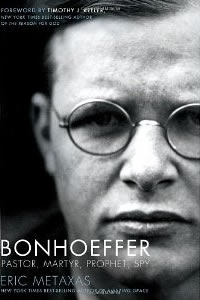Book Notes
 Eric Metaxas, Bonhoeffer: Pastor, Martyr, Prophet, Spy (Nashville: Thomas Nelson, 2010), 624pp.
Eric Metaxas, Bonhoeffer: Pastor, Martyr, Prophet, Spy (Nashville: Thomas Nelson, 2010), 624pp.
A review by Brad Keister.
Bonhoeffer follows another recent book by Eric Metaxas — Amazing Grace — that was released together with a feature film. It is difficult for many Americans to understand the Germany of the 1930s from an ocean away and now decades into the past, but Metaxas provides an amply successful narrative — so effective, indeed, that it brings the reader face to face with the profound depth of evil that Adolph Hitler brought to the world and pushed relentlessly into every corner of his realm. Modern media can make us numb to reports of unspeakable atrocities; in Nazi Germany, such acts were part of a grand perspective that was kept from public view, but made some of Hitler’s generals physically sick as they learned of it. In the midst of this was Dietrich Bonhoeffer, who saw and felt to the core of his being more clearly than most what was happening around him during this time.
Bonhoeffer was the son of a prominent neurologist (one of the first in a new field) among other gifted siblings in a family that enjoyed privilege in society. His parents had great love for each other and imparted that love and a strong family bond to their children, along with a strong sense of discipline and duty. Bonhoeffer could easily have had a distinguished career as a seminary professor, but his devotion to Jesus Christ compelled him to address the pressing challenges of his time, and he feared the risk of seclusion in an abstract world of theology. For all of his adult life he struggled with the question, what is a good choice when evil is pervasive and all options seem to carry unacceptable consequences? His journey took him in directions that he would never have imagined at the outset. He built upon his experiences, which included a trip to New York in the 1920s, where he saw emptiness at Union Seminary and Riverside Church, and a grounded real faith at the Abyssinian Baptist Church in Harlem.
In the end he saw it as God’s personal call that he must work to eliminate Hitler as the only solution to the desperate state of evil that filled his world. He obtained a position in the Abwehr, a German intelligence agency that was often at odds with the SS, using it to gain access to information and key allies in assassination plots. He never judged others for taking different paths. In fact, many close friends were sometimes puzzled by Bonhoeffer’s actions (some involving secrets he could not divulge), not knowing whether he was acting as a pro-Nazi or a Christian. Bonhoeffer concluded that making decisions based upon a theology alone was not sufficient in such a chaotic world. Only God’s leading through his personal relationship with Jesus would be enough for him to persevere.
An assassination attempt in July 1944 failed, and the SS finally caught up with Bonhoeffer, whereupon he was imprisoned. He and other co-conspirators were hanged in 1945 at Flossenburg Prison, just two weeks before the prison was liberated by the Allies, probably on the direct and personal order of Hitler, who, even knowing that the end of the Reich was near, chose to carry out yet one more vindictive act. Executions also claimed the lives of Dietrich’s brother Klaus and two brothers in law.
Bonhoeffer’s legacy is of course his books: Ethics, The Cost of Discipleship, Letters and Papers from Prison, among others. After reading this skillful narrative by Metaxas, it is difficult to imagine understanding Bonhoeffer’s work without knowing of his life.


